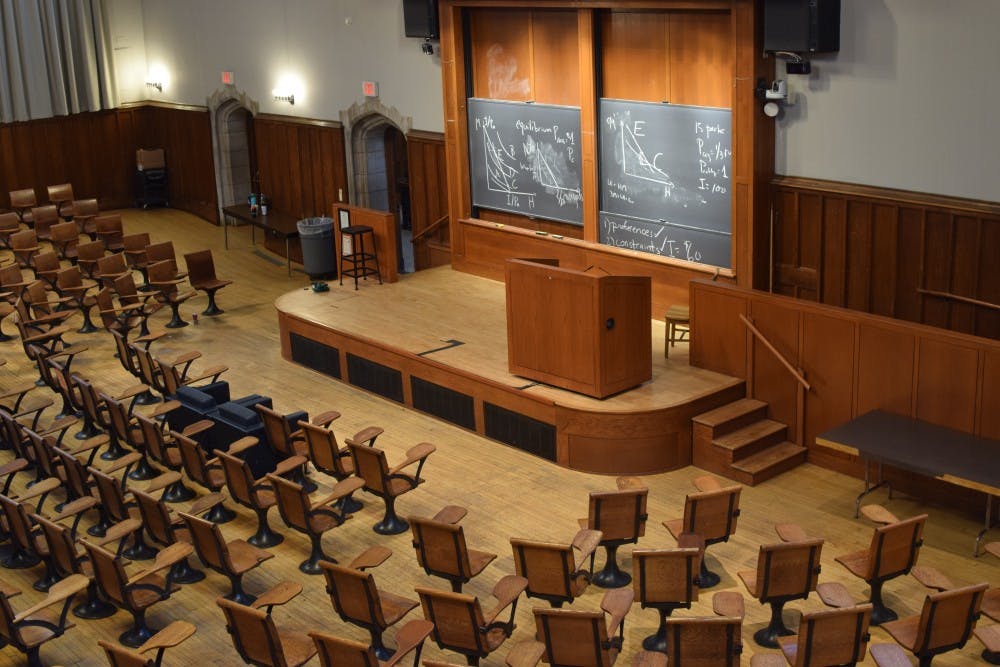Wars, humanitarian crises, politics, shifting COVID-19 regulations, and many other issues dominate the media and public discourse week in and week out. To better help students fully utilize their education and responsibly enter this global discourse, Princeton should encourage faculty to develop adaptable course curricula that incorporate current events into classroom discussions. This will enable students to connect the theoretical or historical aspects of courses they are taking to real-world situations.
The Princeton classroom provides an ideal opportunity for students to apply important theoretical knowledge from weekly assigned readings to the various situations that we see in daily headlines. Instead of limiting students’ engagement with these issues to news consumption or on-campus events — which are not always feasible options for many students — faculty could use their classroom as a space to shepherd students into practical thinking throughout the semester.
Incorporating discussions and critical thinking about current events into Princeton’s pedagogy would acknowledge several important realities. The talks, discussions, club meetings, and virtual resources that we currently have allow students to engage with these topics, and it is a good first step. Nevertheless, they can be further complemented with classroom discussions to give students more opportunities to be engaged.
One of the main tenets of the University's educational mission is to prepare students to contribute positively to academic or community discourse before and after graduation. Concentrating in a subject, getting a certificate, or even just taking some classes within a department, should better position us to provide informed commentary and engage thoughtfully in the global discourse on a wide variety of topics. This is especially true when current events almost always have something to do with what we are learning.
However, with the intensity of a busy course load and other obligations, some students are unable to engage with these world issues on a daily basis. For this reason, why not encourage a learning environment where those students can still actively participate in thought-provoking discussions led by Princeton’s highly respected faculty without having to compromise their heavily packed schedule outside of class?
A few weeks ago, the evening that Russia’s invasion of Ukraine began to take over the headlines, a friend remarked that the events unfolding were far too important to ignore, so her assignments would have to wait until another day. People care about the war in Ukraine, as with many other world events, for a variety of reasons. Some were initially concerned about the possibility of the United States sending troops, while others have family and friends who are directly affected. Many more are worried about civilian casualties, the unfolding humanitarian crisis, and the sovereignty of a nation being threatened. Issues like this are too important not to be incorporated into classroom discussions, especially if Princeton truly aspires to nurture future scholars who will be responsible for addressing these very issues in their own lifetime.
Princeton offers every student a myriad of programs, talks, and discussions on campus about current issues, often with some of the most well-respected scholars in the world. Some of these programs are accessible to all, while others may be out of reach to those with a busy schedule. Efforts have been made to make these opportunities more accessible: some discussions are now over a meal, while others are presented in a virtual format that may allow for remote or later viewing.
Yet, conversations about these topics could and should be more integrated into the everyday lives of students. Princeton’s faculty are some of the leading figures in the national discourse on the very subjects they are teaching, but rigidly structured syllabi lead them to bypass important ideas to stay on schedule. Even though classes make up only a small portion of the Princeton experience, they are, of course, the primary time during which students can expand their knowledge and hone analytical skills needed to apply textbook learning to real-world challenges.
Because of this, faculty should be encouraged to design their courses with more flexibility by incorporating topics that students may come across in real time through the news into the material that is being taught. Such a move would increase students’ engagement, bring in new and fresh perspectives on other materials they are learning, and encourage students to contextualize what they are learning in class in light of what is going on in the world around them.
I recently argued that academic freedom should not cover speech that falls into a broader definition of “hate speech.” Some could say that by bringing politics into the classroom, professors could risk making people feel like they are not able to teach objectively. However, professors speaking on any current events does not mean they are just espousing personal beliefs. In fact, they are well equipped to explain the ongoing intellectual discourse from different perspectives without being too partial. As such, the integration of current world issues into the classroom — even those that are somewhat controversial — is an acknowledgment that excellent learning and teaching can and should take different forms and perspectives.
We are all better off when students and faculty are actively contributing to real-world discussions in the classroom. Creating avenues for students to do this throughout their time at Princeton will lead to better informed conversations and beliefs about current events, and make classes as relevant to students as possible.
Mohan Setty-Charity is a sophomore from Amherst, Mass. He can be reached at ms99@princeton.edu.









